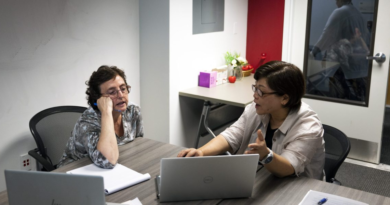Swiss fintech nsave gets $4M to enable people from unstable economies open offshore accounts

Swiss fintech nsave, which is making banking in Switzerland accessible to people in countries with unstable banking sectors or facing high inflation, has raised $4 million seed funding. The round was co-led by Sequoia Capital and TQ Ventures with participation from Y Combinator, ACE Ventures, SV Angel and FONGIT: the State of Geneva organization that supports tech startups.
Amer Baroudi and Abdallah AbuHashem co-founded nsave in 2022 from lived experiences. Baroudi told TechCrunch that he witnessed his family lose their life savings due to currency devaluation and the inability to open bank accounts in foreign countries upon fleeing war in Syria years ago, as they were regarded too risky.
He said offshore banking has always been accessible to a small number of people, often the wealthy or those with great networks, adding that nsave is out to democratize that access to everybody else.
“It’s a very simple product so far: a trusted account abroad that you have where you can keep your savings in the hard currencies of the dollar, euro or pound for now and can access it when you need to,” Baroudi told TechCrunch, adding that the fintech has partnered with regulated financial institutions to offer the service.
To access, users need to sign up on the app, and go through an onboarding journey that Baroudi says involves risk assessment based on the strict banking regulations they need to observe.
“What is really exciting is how we approach solving this. We want to rethink how we do risk assessment and, actually, we need to put proper safeguards in place to assess the real risks because where you come from is actually not the risk factor,” he said.
“And then based on the risk scores, you might be prompted into different streams of questions or enhanced due-diligence mechanisms. We might ask you for additional documents. A lot of this is automated and happens dynamically.”
Past the onboarding, the fintech uses its proprietary monitoring transaction tool to ensure it observes Swiss banking regulations, including anti-money laundering and counter-terrorist financing laws.
Baroudi said the duo, previously Rhodes scholars in the U.K, picked Switzerland owing to the strides the European country has made to foster innovation, including a fintech license regime. The license allows fintechs to act as financial intermediaries as they work towards becoming fully-regulated banks.
He says the fintech is in the early stages of product development, but will continue to double down on the savings and wealth side of retail banking as they listen and strive to meet the needs of their target customers, keeping to their mission of building safe banking for the financially-excluded.
“We understand what it means to be financially excluded, the impact, the struggles and the challenges of this problem…that is why we are building a platform where people from distressed economies can protect their savings and grow their wealth,” he said.
The company is targeting millions of people in struggling economies, for instance, Lebanon where inflation is sky high, currency has devalued by over 90%, and people can only access limited savings as banks set draconian limits.
“Developing a global product that is compliant with strict financial regulations is no easy task, not to mention building partnerships with banks – yet the nsave team has done just that,” said George Robson, Partner Sequoia Capital. “Now nsave is live, there’s finally a trusted option to protect their users against the rampant inflation of distressed economies, providing safe, stable offshore accounts to people who need them the most.”
Updated to indicate that the fintech will only serve people from distressed economies.



